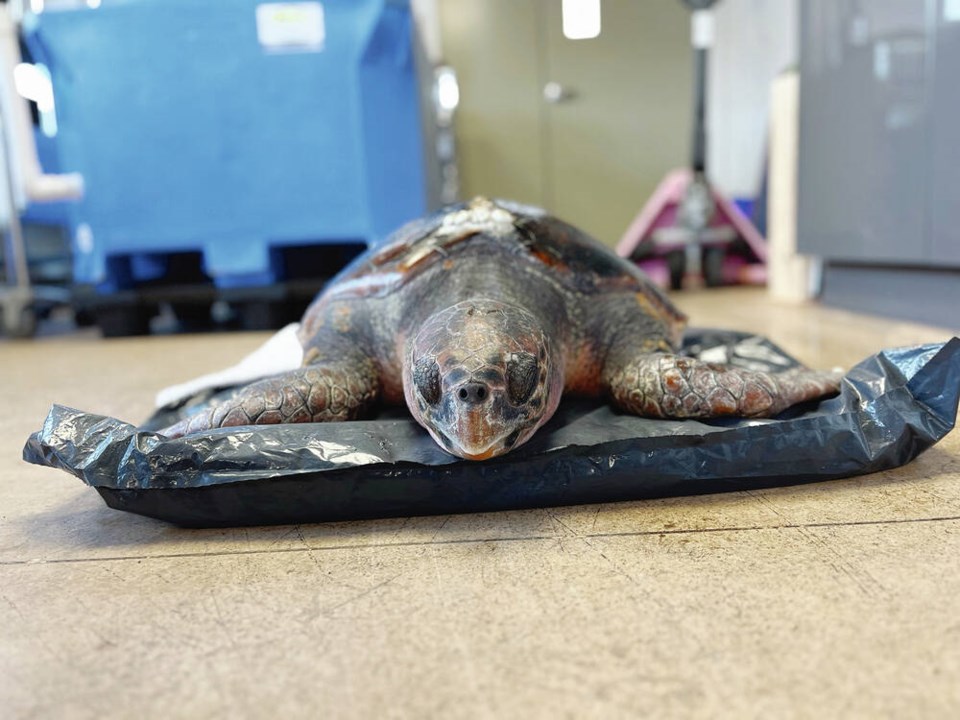A wayward loggerhead sea turtle found languishing in bull kelp at Pedder Bay near Metchosin is an incredibly rare find in British Columbia waters, according to Fisheries and Oceans sa国际传媒.
In fact, it’s only the second confirmed sighting of a loggerhead on sa国际传媒’s coast — and the first ever to be taken into care, said Lisa Spaven, a scientist in DFO’s aquatic ecosystem and marine-mammal section based in Nanaimo.
The female loggerhead is being nursed back to health by the Vancouver Aquarium Marine Mammal Rescue Society after the reptile was found by fishers checking their crab traps and cleaning up litter on Sunday at Pedder Bay.
With a DFO permit, the turtle was rushed to the Vancouver Aquarium suffering from hypothermia.
Since dubbed Moira, she weighed in at 38 kilograms and is estimated to be a “sub-adult” of 15 to 20 years old. Loggerheads can live up to 80 years and don’t reach breeding age until over 30.
Aquarium spokesman Todd Hauptman said the marine mammal rescue team has been working hard to stabilize the cold-stunned sea turtle.
Moira’s core temperature was just 8.4 C on admission. Normal temperatures range from 14.5 to 20 C, said Spaven, meaning cold shock had set in and would have eventually been fatal for the turtle.
Hauptman said the turtle is receiving fluid therapy, antibiotics and plenty of “TLC” from vet staff.
“The team is slowly increasing her temperature by a degree or two per day, careful not to increase too quickly,” he said.
The only other confirmed sighting of a loggerhead sea turtle in sa国际传媒 waters was in 2015 about 80 kilometres offshore from Tofino, when crew aboard the Canadian Coast Guard Ship John P. Tully spotted a loggerhead near the ship.
The turtle was smaller than Moira, said Spaven, and covered in algae, meaning it had not been active and was likely in cold shock.
Spaven said it’s unclear how Moira the loggerhead ended up at Pedder Bay, about 500 nautical miles from its northernmost range in the Pacific Ocean.
The North Pacific loggerhead turtle population, currently listed as an endangered species in the U.S., originates from nesting sites in Japan and roams the ocean in currents, occasionally foraging closer to land along the U.S. coast from Oregon down to Mexico.
“It could be that she got caught in a warm current and got spit out where it’s too cold,” said Spaven. “Every situation could be different, but you just don’t know.”
Spaven said changing weather patterns and ocean temperatures as a result of climate change could be affecting the distribution of prey.
Loggerhead sea turtles are carnivores, only occasionally consuming plant material, according to the U.S. National Oceanic and Atmospheric Administration.
During their open-ocean phase, they feed on a wide variety of floating items. Unfortunately, trash and other debris discarded by humans also tends to accumulate in their habitat. Small fragments of plastic are often mistaken for food and eaten by turtles.
Juveniles and adults in coastal waters eat mostly bottom-dwelling invertebrates such as whelks, other mollusks, horseshoe crabs and other crabs. Their powerful jaws are designed to crush their prey.
Spaven said the loggerhead found at Pedder Bay was likely eating jellyfish.
Adult loggerhead turtles typically weigh 135 kilograms, but larger specimens can weigh up to 450 kilograms.
The rescue operation involved local fishermen Sean Hutchinson and his father and other fishermen who called Victoria zoologist Anna Hall. They a co-ordinated efforts with DFO’s Marine Mammal Rescue Unit, sa国际传媒 Ferries and staff at the Vancouver Aquarium to get the turtle into care.
Hutchinson and Hall loaded the sea turtle onto a wheelbarrow and into the back of an SUV, all the while talking with scientist Paul Cottrell of DFO, sa国际传媒 Ferries and the Vancouver Aquarium.
sa国际传媒 Ferries got them on a 7 p.m. sailing and staff from the aquarium were waiting when the vessel arrived at Tsawwassen.
For Hutchinson, it felt good. “You never know what you’re going to find,” he said. “It’s all about our ecosystems … coming together with avid fishermen and figuring out the best solution for this.”
Spaven said all sea turtles are rare in sa国际传媒 waters, though she has recorded a handful of cases of green and olive Ridley sea turtles, both hard-shell species. Soft-shelled leatherback sea turtles are more common, with about 150 sightings on the coast, because they are more tolerant of colder waters, she said.
Moira’s release could be several months away, depending on when she fully recovers. If that happens, the sea turtle will likely be released somewhere along the U.S. coast within her normal range, Spaven said.
The Committee on the Status of Endangered Wildlife in sa国际传媒 listed loggerhead sea turtles as endangered in sa国际传媒 in 2010, specifically citing the Atlantic population because the turtles are more common there.

— With files from Alanna Kelly
>>> To comment on this article, write a letter to the editor: [email protected]


